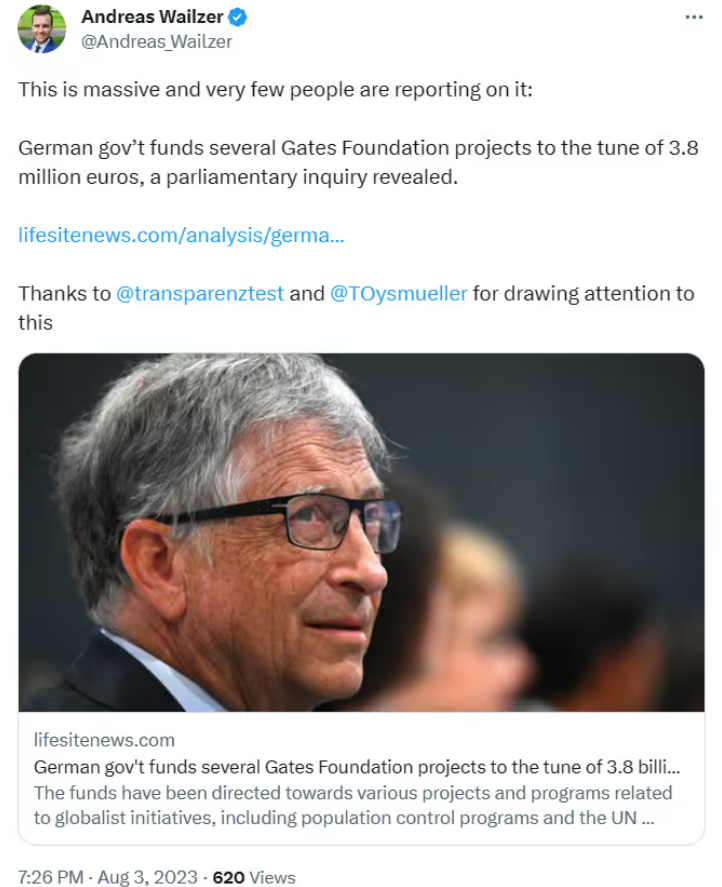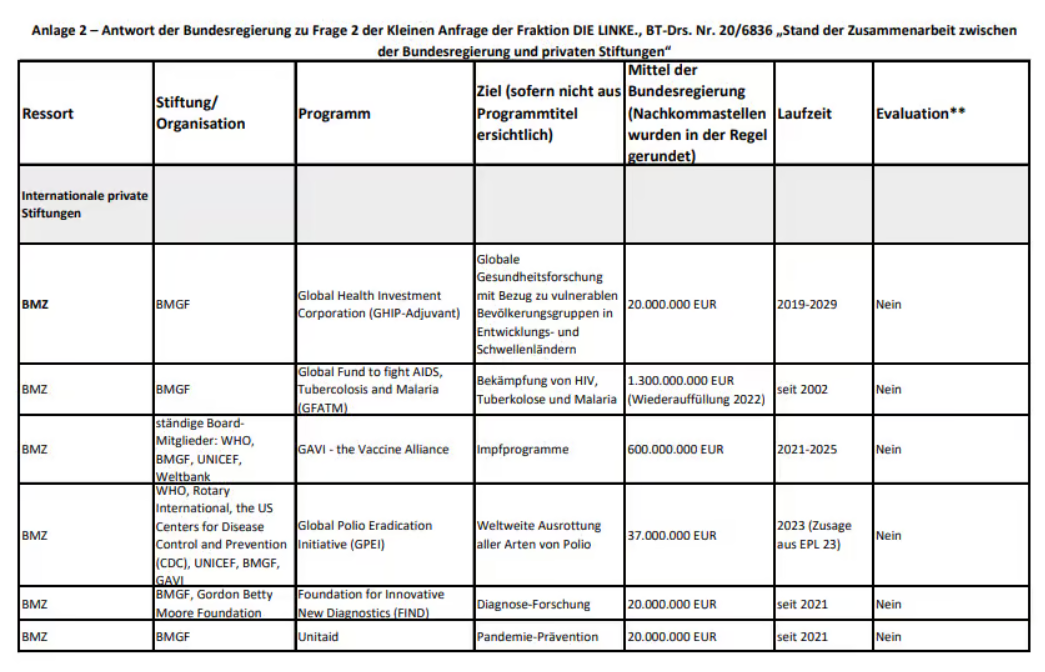Table of Contents
Robert Kogon
Robert Kogon is a pen name for a widely-published financial journalist, a translator, and researcher working in Europe.
The headline of a recent LifeSiteNews article declared that “the German government funds several Gates Foundation projects to the tune of 3.8 million euros.” This is a somewhat curious revelation, but not surprisingly, given the relatively paltry sum, it did not inspire more than a flurry of interest on social media. But the problem is that the actual total cited in the German source for the article is not €3.8 million, but rather €3.8 billion.
On closer inspection of the relevant data, moreover, it turns out that the funding is not so much German funding of the Gates Foundation as German co-funding of projects or programmes with the Gates Foundation.
LifeSiteNews eventually corrected the erroneous figure in its headline, but only after several days, by which time the initial buzz had passed. Although the preview has been updated, the confusion is still apparent in the below tweet by the article’s author. This is particularly odd given that the author is Austrian and hence surely knows that Milliarden, the figure cited in the German source for the article, is billions, not millions. Furthermore, the correct figure was always provided in the body of the text, albeit with an erroneous conversion into millions, rather than billions of dollars.

The source is an article on the German website Transparenztest (Transparency Test), which in turn cites funding data furnished by the German government itself in a June 29th written response to a parliamentary query on German cooperation with private foundations.
Transparenztest calculated the €3.8 billion total based on the German government data. This total includes both funding for joint German government/Gates Foundation projects and non-project-linked German contributions to programmes. Unfortunately, however, Transparenztest has misconstrued the nature of the latter funding.
Virtually all the programme funding consists not of German funding for Gates Foundation programmes per se, but rather of German co-funding for programmes in which the Gates Foundation is also, to a greater or lesser extent, involved.
The project funding involves 9 joint projects of the Gates Foundation and the German Ministry of Economic Cooperation and Development (BMZ). The total project funding comes to nearly €450 million. The project funding covers a period from 2017 (the earliest start date) to 2025 (the latest completion date).
The more copious programme funding involves 22 programmes and comes to nearly €3.4 billion. The funding is spread out over a period of more than 25 years from 2002 (the earliest start date) to 2030 (the latest completion date), although, as Transparenztest stresses, most of the grants are more recent. Here too, most of the funding comes from the Ministry of Economic Cooperation and Development, although a few of the grants were made by the Ministry of Education and Research.
Some of the programme entries in the German government data identify the Bill & Melinda Gates Foundation (BMFG) as one sponsor among others, whereas other entries list it as the sole sponsoring ‘foundation/organisation.’ See, for instance, column 2 in the below excerpt from the data.

In keeping with the subject of the parliamentary query, however, this appears only to mean that the Gates Foundation is the sole private sponsor involved. Virtually all the programmes involve significant public sponsorship, not only from Germany, but also from many other countries and international organisations.
This is the case, for instance, for all three of the programmes for which just the Gates Foundation is named in the ‘Foundation/Organisation’ column in the above excerpt: the Global Health Investment Corporation, the Global Fund to Fight AIDS, Tuberculosis and Malaria, and Unitaid.
None of them are Gates Foundation programmes per se. Far from it.
For example, the Global Fund’s latest funding figures show that not only its German funding, but indeed funding from many other countries, including France, Canada, and the USA, easily outstrips the funding it receives from the Gates Foundation. (Contrary to the German government analysis, incidentally, they also show that the organisation receives support from many other private sources as well.)
Similarly, whereas the Gates Foundation sponsored the founding of the Global Health Investment Corporation (GHIC) in 2012, the organisation’s own website explains that:
The Government of Germany, acting through the German Federal Ministry for Economic Cooperation and Development (BMZ) and the KfW Development Bank, helped capitalize GHIC with an initial grant and remains a key strategic partner and funder of GHIC.
A more detailed analysis of the German government data is undoubtedly in order. What is clear, at any rate, is that Germany is a crucial partner – not funder – of the Gates Foundation and that the co-funding it has provided both to projects and to programmes in this capacity runs into the billions, not the millions.









